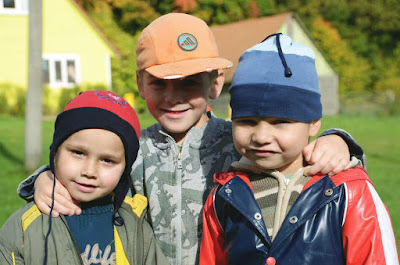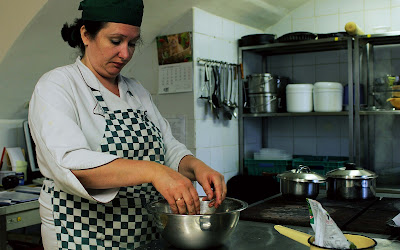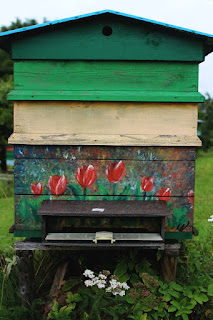Finally, life is an amazing thing: sometimes
it leads us to places we didn’t even think about, but at times we suddenly find
ourselves at that very place, that we were unassumingly thinking about maybe
once.
Photo: Stephan Soudiere
In conclusion, the link to the
official Grasi website: http://www.grasufonds.lv/lv/english/
This link is here to attract your attention to the process of construction of the fourth home for the children. There are no sponsors, no big PR-campaign too, so if you have a possibility (in having a desire I have no doubt), please, help to build another house, where children's dreams will have all the chances to come true.
http://www.grasufonds.lv/lv/english/ziedot-bernu-namam-grasi/
We faced the second case. Stephan knew about
one unusual place in Latvia, which is located by the small (and beautiful) city
of Cesvaine. This place is an orphan home – Grasi. It was founded many years
ago by a Frenchman. I do not remember, how exactly he appeared in Latvia with
such good intentions, but it happened, and this is important.
Now Grasi is a three children's houses where friendship and family relations are living together. Yes, in those houses children have a real life: in Grasi there is no traditional "camping system", where twenty children live in the same dormitory. Here everything is as close to life realities as possible: in each house there are from 4 to 5 rooms where the kids are living. Rooms are cosy and comfortable, each child has its own area, which by time gets a personal reflection of its inhabitant.
Now Grasi is a three children's houses where friendship and family relations are living together. Yes, in those houses children have a real life: in Grasi there is no traditional "camping system", where twenty children live in the same dormitory. Here everything is as close to life realities as possible: in each house there are from 4 to 5 rooms where the kids are living. Rooms are cosy and comfortable, each child has its own area, which by time gets a personal reflection of its inhabitant.
Some children literally have to learn how to
live in a normal environment from zero: they keep the room clean, they go to school
and walk, they do sport and art, and they learn how to communicate with other
children and adults. All this is critically important for children that
experienced the lack of parental care, attention, education and warmth.
Otherwise, it is easy to get lost in this vast and unfortunately, not always
welcoming world. Here the guardians of Grasi try to teach children all the
necessary, all the most interesting, all the most important. And they do it
right, with the responsibility and lot of love.
Heart shrinks from all of it, and at the same time it feels a drop of a relief and a joy. It shrinks from the thought that the children were left by parents when they are in a very fragile state. But it feels a release too: children are in hands of really good, smart and big-heart people.
Heart shrinks from all of it, and at the same time it feels a drop of a relief and a joy. It shrinks from the thought that the children were left by parents when they are in a very fragile state. But it feels a release too: children are in hands of really good, smart and big-heart people.
After a while I got a logical question: how
these kids got there? Is there kind of selection? Are there any special
conditions? No, it comes by chance, even if it comes after a big life
misfortune. In Latvia there are some centres, where children get for the first
time, only after they are distributed to children's homes. This process is
simple: this organization sends a request to an orphan house for an available
place, if the answer is positive, the child goes there. The same thing happens
in Grasi: no favorites, no “ better” or ”worse” - all children are equal, only
chance plays a role.
And those who got in Grasi, they are really lucky. All kids are different: babies and youngsters, active boys and tender girls, storm petrels or demure. And all, without exception, have a chance to fly from the Grasi’s nest as strong and confident birds. The talents and interests of every child are supported and developed: there are future artists and architects, chefs and engineers.
And those who got in Grasi, they are really lucky. All kids are different: babies and youngsters, active boys and tender girls, storm petrels or demure. And all, without exception, have a chance to fly from the Grasi’s nest as strong and confident birds. The talents and interests of every child are supported and developed: there are future artists and architects, chefs and engineers.
Almost every kid earlier or
later starts speaking French: every year they go to France for summer holidays,
where they improve the language and broad the mind. Some of them decided to go
and establish there when getting adult age and they can count on the support of
their Latvian home. Some children decide to stay in Latvia. But the thing is
that even if the child is not adopted by someone, he or she does not remain
without any warmth or support. Grasi always stays their home with a big and
loving family that always glad to see them.
We were offered a one-day break in Grasi.
And we didn’t refuse it! From that point we didn’t have any schedules or plans.
So that, we were placed in a beautiful building of the Grasi hotel - another
good thing the Frenchman and all Grasi's team did.
The building was playing a
variety of roles before it became an amazing place to stay: there was a cinema,
a Soviet store and barn, a post office and after a forgotten, useless building.
The restoration lasted about 25 years, and now it's such a cosy place! The
French taste and sense of aesthetics were not difficult to notice. Well, we
have noticed it and just enjoyed it.
Hotel Grasi Pils, in fact, is
another way to support the important initiative, children's homes. But they do
not say about it a lot, do not advertise, trying to attract attention, they are
just doing their job with love and proper care, no matter why guests chosen
this place to rest.
The resting day there, should
be pleasurable indeed: around - green forests, bit further - clear lakes, a bit
far – the lovely town of Cesvaine. Small nice town very proud of its castle of
an unusual beauty, of its basilica where the music of an open organ is played,
for its cheese factory that won’t leave you hungry, and for its nice streets which
are pleasant to walk. I described the town briefly but concisely – all in order
to invite you there. To conclude, the town of Cesvaine was another great
discovery!
It was impossible for us to
rest there just one day: the place and its people were so good so we decided to
stay one more day. And we were welcomed.
The next day my culinary cognitive interests
led me to a woman, Marina, who is the main chef of Grasi – she cooks for both
children and adults. It was interesting to find out what and how she cooks for
children to sweeten their life.
I started the conversation with
questions about the menu they have, how it is composed, and who loves what. All
menus of orphan’s houses are coming from “the top”. Marina showed me a week
menu and immediately rebelled against it. Simply because even if the food is
tasty and nutritious, the portions are not big enough for teenagers. Usually
children are more active than adults and thinking as well about the process of
growing, food is very important. That’s why quality standards in Grasi are
certainly respected, but the kids do not stay hungry at all.
I was glad to hear that children are not indifferent to cooking too. If there is a desire, everyone can come in the kitchen to help Marina. And she will definitely find interesting and useful thing to do for everyone. And even those who have no desire of such kind, won’t miss the chance to learn how to cook in Grasi: Marina regularly makes intermediates and sends them to the children, so they finish the cooking themselves. This way they learn how to cook side dishes and reheat meatballs, how to make pancakes on Sunday morning.
And again, it is the story about children's education: it should be disparate, it should include the basic skills of life, which they did not have, but which are given here. It makes them stronger, more curious and intelligent. In my opinion, that's very right thing to do.
I was glad to hear that children are not indifferent to cooking too. If there is a desire, everyone can come in the kitchen to help Marina. And she will definitely find interesting and useful thing to do for everyone. And even those who have no desire of such kind, won’t miss the chance to learn how to cook in Grasi: Marina regularly makes intermediates and sends them to the children, so they finish the cooking themselves. This way they learn how to cook side dishes and reheat meatballs, how to make pancakes on Sunday morning.
And again, it is the story about children's education: it should be disparate, it should include the basic skills of life, which they did not have, but which are given here. It makes them stronger, more curious and intelligent. In my opinion, that's very right thing to do.
There was another important point in our
conversations with Marina and Sandra, the Director of Grasi, it's to take pity
on them. In the context of children’s lives it can be very insidious. If to
talk about raw facts, it makes children weak. If to talk less obviously, some
children may abuse of being pityful, turning it into an instrument of
indulgence, and as a consequence, they do sign a verdict for the future
helplessness in the real world.
Everything that is in Grasi – is an
intelligent guardianship, life education and real human warmth. All those
things that really work. And the result of it –the children found a family and
became self-reliant and self-sufficient too.
There are children that went to France and
work as chefs in top restaurants, there are those who stay in Latvia and work
as architects and engineers. There are plenty stories, all are all different.
But the point is that the work of Grasi is light and hearty and it allows those
children who were unfairly left out of the family, to live the way their hearts
tell them.
I said a lot and now it is time to show
people, who are not many, but who put all mental and physical forces to Grasi
and its inhabitants to let them live a happy life. Thank you a lot!
This link is here to attract your attention to the process of construction of the fourth home for the children. There are no sponsors, no big PR-campaign too, so if you have a possibility (in having a desire I have no doubt), please, help to build another house, where children's dreams will have all the chances to come true.
http://www.grasufonds.lv/lv/english/ziedot-bernu-namam-grasi/












































